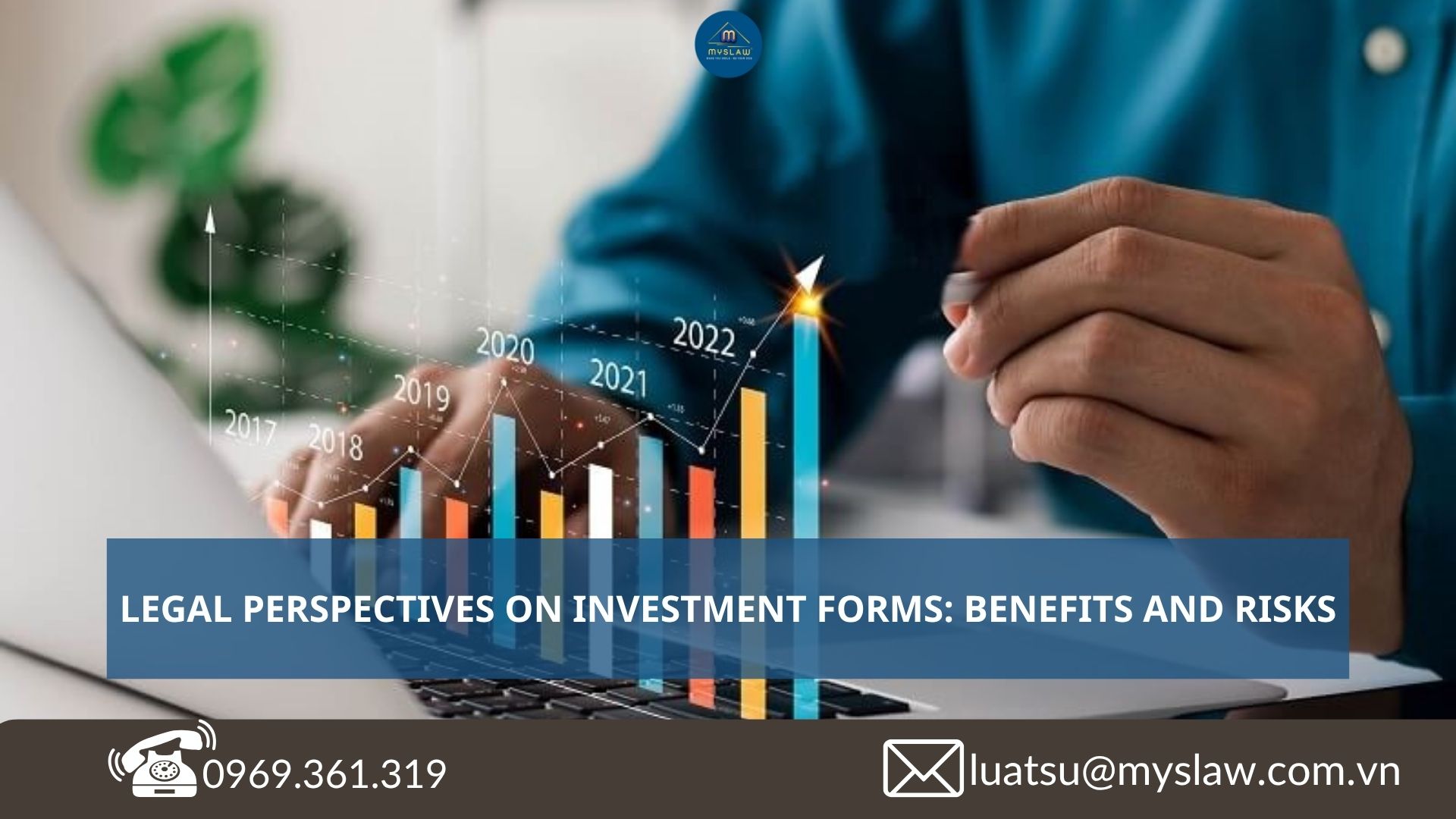Choosing an appropriate investment form is critical in the process of implementing a business project. The selected investment form governs the entire project execution mechanism, determining whether the project can be carried out swiftly, smoothly, and efficiently. Therefore, one of the most crucial tasks for investors is to select the optimal investment form. According to Article 21 of the Investment Law No. 61/2020/QH14, dated June 17, 2020, the following investment forms are available:

1. Forms of Investment
The Investment Law 2020 outlines the following investment forms:
- Establishing an economic organization.
- Contributing capital, purchasing shares, or acquiring capital contributions.
- Implementing an investment project.
- Investing under a Business Cooperation Contract (BCC).
- New investment forms and types of economic organizations as prescribed by the Government.
A notable change in the Investment Law 2020 compared to the 2014 version is the exclusion of detailed provisions for Public-Private Partnership (PPP) investments. This is due to the introduction of a separate Law on Public-Private Partnership, effective from January 1, 2021. The new law provides a higher and more stable legal framework for PPP investments, replacing the previous decree-level regulations that were subject to multiple laws, such as the State Budget Law, Investment Law, Public Investment Law, Environmental Protection Law, Enterprise Law, Land Law, Construction Law, and Public Debt Management Law.
This shift addresses several issues:
- Stability of Legal Framework: Previously, PPP regulations at the decree level were unstable and required frequent adjustments, creating challenges for both the state and enterprises in large-scale, long-term PPP projects. A dedicated PPP law ensures a more consistent legal environment.
- Risk Mitigation: PPP contracts often span 20–30 years, and investors, along with lenders, require legal stability. The PPP Law minimizes risks associated with policy changes, fostering a reliable investment environment.
- Enhanced Support Mechanisms: The PPP Law introduces comprehensive mechanisms, including incentives and investment guarantees, making PPP projects more attractive and ensuring their successful implementation. This is a significant policy advancement, widely recognized by investors and international organizations.
The PPP Law builds on effective existing regulations while introducing new provisions tailored to the unique nature of PPP investments, creating a more stable legal environment for future projects.
2. Advantages and Disadvantages of Investment Forms
a. Establishing an Economic Organization
Advantages:
Establishing a new economic organization grants foreign investors legal entity status in Vietnam, enabling them to exercise their rights more effectively. This form allows for flexible project scales, with profits and legal responsibilities distributed according to capital contributions, ensuring fairness among investors. It provides a robust framework for protecting the rights and interests of all parties involved, making it one of the most suitable investment forms for ensuring long-term stability and equity.
Disadvantages:
The process is relatively complex and time-consuming, as it requires compliance with both the Investment Law and the Enterprise Law. The administrative procedures can be cumbersome, involving multiple steps such as business registration, licensing, and compliance with regulatory requirements, which may delay project implementation.
Conclusion: This form is highly suitable for investors seeking to establish a strong legal presence in Vietnam, as it offers the best protection for their rights and interests. However, the procedural complexity requires careful planning and legal support to navigate effectively.
b. Contributing Capital, Purchasing Shares, or Acquiring Capital Contributions
Advantages:
This investment form allows investors to quickly initiate projects without the need to establish a new entity, saving time and costs associated with administrative procedures. It is particularly appealing for investors looking to enter an existing business or expand their stake in a company without undergoing extensive setup processes.
Disadvantages:
Under Vietnam’s Investment Law, foreign investors seeking to acquire more than 50% of a company’s capital must register their investment, which involves complex procedures. This requirement can limit the investor’s ability to gain controlling interest in the company. Additionally, this form may not balance the interests of all parties, as it often favors existing shareholders or partners, making it less flexible for foreign investors aiming to exert significant control.
Conclusion: While this form is efficient for quick market entry, it is less suitable for investors seeking substantial control due to regulatory constraints and potential conflicts of interest.
c. Implementing an Investment Project
This form involves selecting investors through one of the following methods:
- Land Use Rights Auction: Conducted in accordance with land laws.
- Investor Selection Bidding: Governed by bidding regulations.
Advantages:
This approach allows for transparent and competitive selection processes, ensuring that projects are awarded to capable investors. It is particularly suitable for large-scale infrastructure or development projects, where public interest and regulatory oversight are critical.
Disadvantages:
The process can be time-consuming and highly competitive, requiring investors to prepare extensive documentation and meet stringent criteria. Additionally, the outcome depends on external factors such as bidding conditions or land availability, which may introduce uncertainty.
Conclusion: This form is ideal for large-scale projects but requires significant resources and expertise to navigate the selection process successfully.
d. Investing under a Business Cooperation Contract (BCC)
Advantages:
A BCC does not require the establishment of a legal entity, offering investors greater flexibility and autonomy in decision-making. The absence of a formal entity reduces administrative costs and setup time, as the contract terms are negotiated directly between parties. Additionally, if the cooperation does not meet expectations, terminating the contract is straightforward, minimizing risks for both parties.
Disadvantages:
The lack of a legal entity means there is no formal binding structure between partners, which can lead to disputes or misalignment of interests. Responsibilities, such as legal liabilities or documentation, are often assigned to one party, creating potential imbalances, particularly for foreign investors who may face disadvantages in negotiations or legal recourse. Furthermore, the use of a single partner’s seal for project activities can introduce risks and complications, especially in disputes or audits.
Conclusion: BCCs are suitable for short-term or low-risk collaborations but may not be ideal for complex, long-term projects due to the lack of formal legal protections and potential inequities.
e. New Investment Forms and Economic Organizations
The Investment Law 2020 allows for new investment forms and economic organizations as prescribed by the Government. This provision ensures flexibility to accommodate emerging investment models, such as those driven by technological advancements or innovative business structures. However, specific regulations for these forms are still under development, and their advantages and disadvantages depend on future government decrees.
Conclusion: This form offers potential for innovation but lacks clarity until further regulations are issued, making it a less predictable option for investors at present.
Final Remarks
Selecting the right investment form is pivotal to a project’s success. Establishing an economic organization is often the most secure and equitable option, despite its procedural complexity. Contributing capital or purchasing shares offers speed but may compromise control, while implementing investment projects suits large-scale initiatives with competitive selection processes. BCCs provide flexibility but lack formal protections, and new investment forms offer future potential but remain undefined. Investors should carefully assess their project’s scale, goals, and risk tolerance, seeking legal advice to ensure compliance and optimize outcomes.
The above information is provided by Mys Law. For any questions regarding the content of this article, please contact 0969.361.319 or email: [email protected] for further clarification. Best regards!
Compiler: Nguyen Anh Quan





